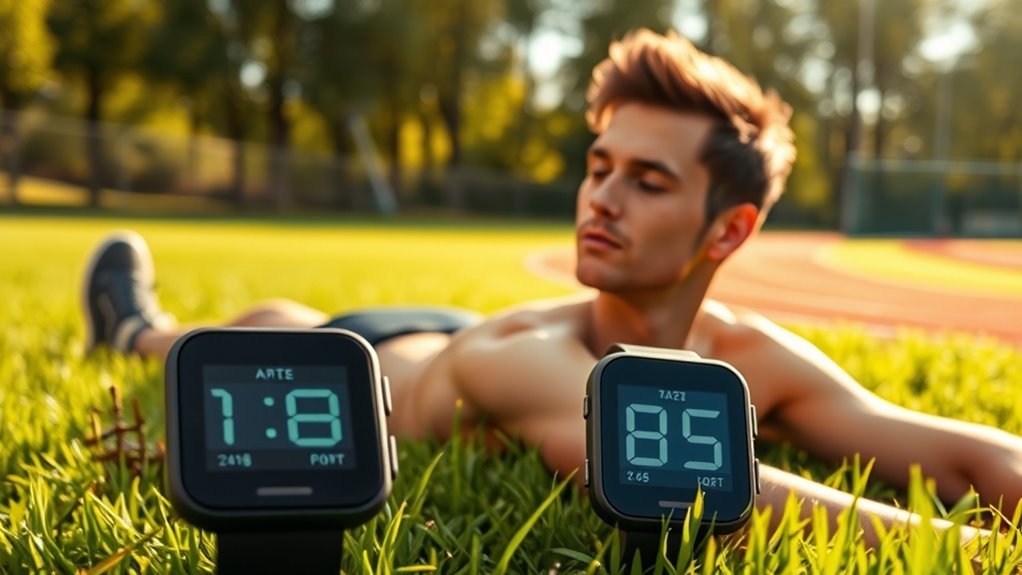Sleep tracking's a game-changer for athletes because it gives you insights to optimize recovery and mental focus. This technology helps you identify patterns that affect your performance and energy levels, allowing for tailored adjustments to your routine. Quality sleep is just as essential for reaching your goals as training. By understanding how sleep impacts your body and utilizing data, you can enhance your athletic performance dramatically. Discover more about implementing sleep strategies to maximize your success.
The Importance of Sleep in Athletic Performance
When you're pushing your limits in training or competition, you might overlook the essential role sleep plays in your performance. It's tempting to sacrifice those precious hours for extra practice, but sleep deprivation effects can be detrimental. Without ideal sleep, your body struggles to recover, leaving you vulnerable to fatigue, decreased focus, and slower reaction times. You might not realize it, but those late-night sessions could be costing you victories.
Understanding Sleep Cycles and Their Impact
Understanding your sleep cycles is essential for maximizing your performance and recovery. Each stage of sleep plays a unique role in how your body heals and regenerates, impacting your athletic capabilities. By recognizing these stages, you can tailor your sleep habits to enhance your training outcomes.
Sleep Stages Explained
Sleep stages play an essential role in how well you recover and perform as an athlete. Understanding your sleep architecture is fundamental; it includes REM sleep and deep sleep, both critical for ideal recovery. When you face sleep deprivation, your circadian rhythm can be disrupted, leading to poor sleep quality. Prioritizing sleep hygiene—like creating a calming sleep environment—can help you maximize the restorative benefits of each stage. Don't underestimate the power of napping; it can enhance performance and combat fatigue. However, be aware of potential sleep disorders that might interfere with your recovery. By mastering your sleep stages, you can access your full potential and enjoy the freedom to perform at your best.
Performance and Recovery Links
While you may focus on training and nutrition, the cycles of sleep you experience are equally essential for enhancing performance and recovery. Understanding your sleep duration and its impact can make all the difference in optimizing your recovery strategies.
| Sleep Stage | Impact on Performance |
|---|---|
| Light Sleep | Prepares the body for deeper rest |
| Deep Sleep | Essential for muscle recovery |
| REM Sleep | Supports cognitive function and mood |
| Total Sleep Time | Influences overall energy levels |
Harnessing the power of sleep tracking helps you identify patterns and make informed adjustments. Embrace the freedom that comes with understanding your sleep cycles, and watch your performance and recovery soar to new heights.
How Sleep Tracking Works
When you want to enhance your athletic performance, tracking your sleep can provide valuable insights into your recovery and overall well-being. Sleep measurement techniques like actigraphy, polysomnography, and even simple sleep diaries offer different levels of detail about your nightly rest. Wearable devices, such as smartwatches and fitness trackers, can effortlessly gather this data, allowing you to monitor your sleep patterns in real-time. These devices track metrics like sleep duration, stages, and disturbances, giving you a thorough view of your sleep quality. By analyzing this information, you can identify trends and make adjustments that align with your specific training goals. It's all about gaining the freedom to optimize your recovery and push your limits further. Embracing sleep tracking opens up new opportunities for you to refine your performance and achieve your personal best, all through understanding how your body recuperates during the night.
Benefits of Monitoring Sleep Quality
Monitoring sleep quality offers a myriad of benefits that can greatly impact your athletic performance. By prioritizing sleep hygiene, you can create an ideal sleep environment that enhances your recovery strategy. This isn't just about getting more hours of sleep; it's about fostering a consistent circadian rhythm that aligns with your training schedule. Improved sleep helps in fatigue management, allowing you to push harder without hitting a performance plateau.
With better sleep, you'll notice heightened mental focus and reduced stress, both essential for peak performance. Additionally, quality sleep plays a significant role in injury prevention, giving your body the chance to repair and strengthen. Athletes who track their sleep can tailor their routines effectively, ensuring they're always at their best. Ultimately, embracing sleep monitoring isn't just a choice; it's a powerful tool for performance enhancement and freedom in your athletic journey. Furthermore, quality sleep is essential for muscle repair and growth, which is crucial for athletic recovery.
Identifying Patterns and Making Adjustments
By recognizing sleep patterns, you can make informed adjustments that considerably enhance your performance. When you track your sleep, you'll start to notice trends that impact your energy levels and recovery. This pattern recognition is key; it helps you pinpoint when you feel most rested and when you're dragging.
With these insights, you can implement adjustment strategies tailored to your needs. Maybe you discover that an extra hour of sleep before a big event boosts your focus, or perhaps a consistent bedtime helps you wake refreshed. Furthermore, ensuring adequate rest days can maximize your recovery and improve your overall performance.
Fine-tuning your sleep schedule isn't just about quantity; it's about quality too. You might realize that certain habits, like screen time before bed, disrupt your rest. By actively adjusting these factors, you empower yourself to optimize your training and performance. Embracing this freedom in managing your sleep can lead to remarkable improvements in your athletic journey.
The Role of Technology in Sleep Tracking
As technology continues to evolve, its role in sleep tracking has become increasingly vital for athletes seeking to enhance their performance. Wearable technology and sleep apps provide you with real-time data analytics, allowing you to monitor your sleep patterns and recovery more effectively. By integrating these tools into your routine, you can gain valuable athlete insights that help you optimize your training.
Recovery technology plays a significant part in performance monitoring, ensuring you're not just pushing your limits but also resting adequately. With advancements in sleep science, you can understand how different factors impact your rest, like stress and nutrition. Tech integration means you can customize your approach, making informed decisions that align with your personal goals. Embracing these innovations empowers you to take control of your sleep, leading to improved performance and overall well-being. Additionally, leveraging recovery technology can further enhance your recovery process and readiness for competition.
Case Studies: Athletes Who Improved Performance Through Sleep
Many athletes have discovered that prioritizing sleep can be a game changer in their performance. Take, for example, a professional basketball player who revamped his sleep habits after tracking his nightly rest. By committing to a consistent sleep schedule, he reported significant performance gains, including sharper focus and quicker recovery times. Another athlete, a marathon runner, used sleep data to fine-tune her recovery strategies. She noticed that when she got at least eight hours of quality sleep, her endurance improved dramatically. These athlete experiences highlight the undeniable connection between sleep and peak performance. By embracing the power of sleep tracking, you can access your potential, just like they did. It's about more than just rest; it's about giving yourself the freedom to perform at your best. So, why not explore your own sleep tracking journey and see what gains await you?
Tips for Optimizing Sleep Based on Tracking Data
While sleep tracking can reveal valuable insights, implementing effective strategies to optimize your rest is essential for maximizing athletic performance. Start by creating a comfortable sleep environment—think cool, dark, and quiet. Establish a pre-sleep routine that signals your body it's time to wind down, incorporating relaxation techniques like deep breathing or meditation. Pay attention to dietary considerations; avoid heavy meals and caffeine close to bedtime. Light exposure matters too—limit screens an hour before sleep to promote melatonin production. Aim for a consistent schedule by going to bed and waking up at the same time daily, even on weekends. Prioritize sleep hygiene by keeping your sleeping area tidy and limiting distractions. If you find yourself feeling groggy, explore effective napping strategies to recharge without disrupting your nighttime sleep. By fine-tuning these aspects, you'll harness the full potential of your sleep data. Additionally, incorporating active recovery workouts into your routine can enhance overall recovery and improve your sleep quality.
The Future of Sleep Tracking in Sports Science
With sleep optimization strategies in place, the next frontier lies in the evolving landscape of sleep tracking technology. Imagine a future where sleep innovation empowers you to access your full athletic potential, tailoring your recovery like never before. As devices become more sophisticated, they'll track not just duration but also the quality of sleep, recognizing patterns that help you adapt your training regimens for peak performance.
Future predictions suggest that these advancements will integrate seamlessly with your daily routines, offering personalized insights that feel almost intuitive. You'll have access to real-time data, allowing you to adjust your lifestyle choices in the moment. The freedom to understand your body's unique needs will lead to more informed decisions, paving the way for a new era in sports science. Embracing this technology means you're not just monitoring sleep; you're revolutionizing your approach to athletic excellence.
Frequently Asked Questions
Can Sleep Tracking Devices Be Harmful to My Health?
Sleep tracking devices can potentially be harmful to your health if they lead to sleep anxiety or device addiction. If you find yourself obsessively checking your stats or feeling stressed about your sleep quality, it might be time to reassess how you're using the technology. Freedom in your sleep routine is important, so remember that sometimes, less is more. Prioritize listening to your body over the numbers on a screen for better overall well-being.
How Much Sleep Do Elite Athletes Typically Need?
Imagine an elite athlete like LeBron James, who's known to prioritize sleep as a key part of his training regimen. Typically, elite athletes need about 7 to 9 hours of sleep per night to perform at their best. Sleep duration recommendations suggest that adequate rest optimizes recovery and enhances performance. By focusing on your sleep, you can reveal your potential and enjoy the freedom to excel in your endeavors, just like the pros.
Do Sleep Trackers Measure Naps Effectively?
Sleep trackers can measure naps effectively, but it depends on the device's quality. They typically gauge nap duration and frequency, helping you understand your daytime rest patterns. If you're someone who values freedom in your schedule, knowing how long and how often you nap can be liberating. Just keep in mind that not all trackers are created equal, so choose one that accurately reflects your unique sleep habits and needs.
Can Sleep Tracking Improve Mental Health in Athletes?
Imagine your mind like a wild stallion, yearning for freedom but restless without proper care. Sleep tracking can be the key to taming that spirit! By monitoring your sleep quality, you can reveal the secrets to mental recovery, helping you feel refreshed and focused. You'll notice a dramatic change in your mood and clarity, allowing you to break free from stress and anxiety. Embrace the power of sleep tracking, and watch your mental health soar!
What Should I Do if My Tracker Shows Poor Sleep Quality?
If your tracker shows poor sleep quality, don't stress; there are ways to boost it. Start by refining your sleep hygiene practices. Keep a consistent sleep schedule, create a calming bedtime routine, and limit screen time before bed. Consider incorporating relaxation techniques like meditation or deep breathing. Also, evaluate your sleep environment—comfortable bedding and a dark, quiet space can work wonders. With these sleep improvement tips, you'll be on your way to better rest.



